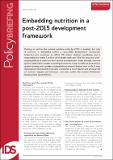| dc.contributor.author | Haddad, Lawrence | |
| dc.contributor.author | Corbett, Hannah | |
| dc.date.accessioned | 2013-12-12T15:45:56Z | |
| dc.date.available | 2013-12-12T15:45:56Z | |
| dc.date.issued | 2013-12-12 | |
| dc.identifier.issn | 1479 974X | |
| dc.identifier.uri | https://opendocs.ids.ac.uk/opendocs/handle/20.500.12413/3267 | |
| dc.description.abstract | Putting an end to the current nutrition crisis by 2030 is possible, but only
if nutrition is embedded within a post-2015 development framework.
Undernutrition continues to afflict 170 million children worldwide and is
responsible for nearly 3 million child deaths each year. The life-long and wideranging
effects of undernutrition cannot be overstated – brain damage, immune
system malfunction, weaker schooling attainment, lower workforce productivity,
greater poverty and a greater susceptibility to chronic disease later in life. A new
development framework must seek to establish a much clearer and stronger set
of nutrition targets and indicators than exist within the current Millennium
Development Goals (MDGs). | en_GB |
| dc.language.iso | en | en_GB |
| dc.relation.ispartofseries | IDS Policy Briefing;33 | |
| dc.rights | Readers are encouraged to quote and reproduce material from issues of IDS Policy Briefings in their own publication. IDS requests due acknowledgement and quotes to be referenced as above. | en_GB |
| dc.rights.uri | http://www.ids.ac.uk/files/dmfile/IDSOpenDocsStandardTermsOfUse.pdf | en_GB |
| dc.subject | Health | en_GB |
| dc.title | Embedding Nutrition in a Post-2015 Development Framework | en_GB |
| dc.type | IDS Policy Briefing | en_GB |
| dc.rights.holder | Institute of Development Studies | en_GB |
| dc.identifier.team | Directorate and Development Office | en_GB |

